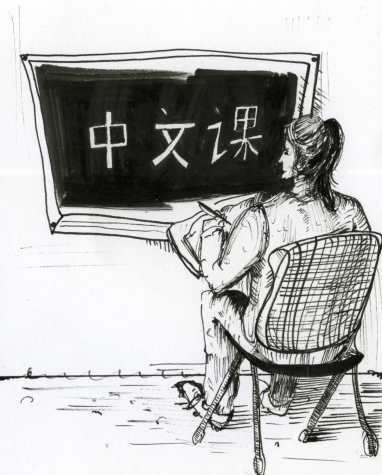Whitman’s Chinese department celebrates new growth after addition of major
April 7, 2022

This year, 2022, is the first year Whitman students will have the opportunity to graduate with a Chinese major, signaling the growing strength of the program. Despite its small size, the Chinese department at Whitman has created an astounding impact, with opportunities for study flourishing locally and internationally.
With many high schools in the states not offering courses in Chinese, many Whitman students are introduced to the language for the first time through the college. For Wencui Zhao, senior lecturer of Asian and Middle Eastern studies and Chinese, this makes teaching the language a unique opportunity for growth.
“To teach students who have no Chinese background is challenging, not just for the instructors but for the students as well. Especially because when the students are learning Chinese, they are pretty much learning two systems. One is the writing system, which is Chinese characters, and the other is phonetic pronunciation for spoken Chinese,” Zhao said.
Thankfully, students are up for the challenge and have been able to use the resources at their disposal to explore a range of possibilities and experiences created by the department. Senior Salma Anguiano credited the dedication of the faculty for her success in Chinese.
“The professors here are so patient and understanding. I think that having that type of environment helps students like myself who have never taken a language before feel really comfortable. They’re always checking in and making sure you’re at the same level as the rest of your peers regardless of your experience level,” Anguiano said.
For senior Jasmine Razeghi, the opportunity to participate in a six-week study abroad program through the National Security Language Initiative for Youth Grant sparked their interest in continuing the language through their four years at Whitman. Anguiano’s experience in the Crossroads Whitman Summer Studies in China program had a similar impact, leading her to apply and be accepted into the highly selected Schwartzman Fellowship graduate program in Beijing.
“Crossroads was the highlight of my time at Whitman; it was the best summer I’ve ever had. I remember our teacher used to take us to a coffee shop near the school every Friday and we’d have a test. It was an oral exam, but it didn’t even feel like a test… it was so cool because the way everything was taught was so different,” said Anguiano.
The Chinese program creates tight knit bonds that give students in the department a unique opportunity to work closely together and truly get to know each other.
“[I remember] Professor Zhao cooked a bunch of different dishes for people in the department and we all ate together at the Asian Studies House. That was an amazing experience because she’s a wonderful cook and I got to be with Professor He and her in a non-academic setting,” said Razeghi.
Despite the program’s influence on students, cuts that removed a tenure track position from the department in 2016 have had a significant impact on those studying Chinese. Now, there are only two professors and one language assistant in the department, making expansions in course offerings and student assistance more difficult.
“The Chinese Department is already really small, so the FSR scared a lot of us and angered a lot of us. A lot of us in the program are really committed, so we know how hard our professors struggle to provide for us. It was a frantic time, and we often talk about the need for the program to expand considering the number of students that are interested,” Razeghi said.
Despite these challenges, the outlook from those in the department remains hopeful. For Donghui He, associate professor of foreign languages and literature in Chinese, the recent student interest in the department signals opportunities for future expansion and administrative support.
“We tailored our major according to students’ needs and the resources we have. On hopes for the Chinese program moving forward, we will continue to offer a full range of modern Chinese language courses while trying to expand our strong curriculum in Chinese literature and culture of the modern period to include the classical periods,” He said. “There was a recommendation from the external reviewer for resuming our discontinued line in pre-modern Chinese literature for the growth of the Chinese program. [We] hope that can come to realization in the perceivable future.”
Language is a critical pillar of a balanced liberal arts education, and the recent growth and achievements within the Chinese Department exemplify the value these programs hold for the students and faculty involved.





